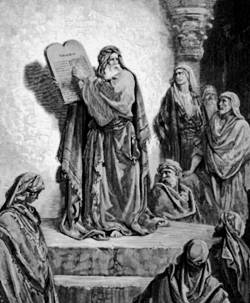
Part Three: The Will of God
Second Commandment
 In both Exodus and Deuteronomy, the wording of the Second
Commandment is the same.
In both Exodus and Deuteronomy, the wording of the Second
Commandment is the same.
You shall not utter the name of Yahweh, your God, to misuse it, for Yahweh will not leave unpunished the man who utters His name to misuse it (Exodus 20:7; Deuteronomy 5:11). The Second Commandment is really an expression of the preceding. It prescribes the respectful use of God’s name and forbids using the Divine Name irreverently. Implied in this precept is the duty to profess by verbal communication our belief in the one true God.
Vocal PrayerFrom the earliest days of the Chosen People, vocal prayers were part of Israel’s religious history. Prayer in the Old Testament is addressed to God alone, both because only God deserves to be praised as man’s Creator and because in Him alone is our salvation. Because of the social character of ancient Israel, vocal prayers and hymns in common were of primary importance. The books of the Old Testament are filled with such forms of communication with Yahweh. The Psalms alone are one hundred and fifty religious lyrics that have also become part of the Christian liturgy. As we enter the New Testament, we find Christ urging His followers to pray, not only privately but together. At the same time, He was very critical of some practices of prayer among the Pharisees. He denounced their hypocrisy, describing them as “devouring the houses of widows while they make long prayers in public (Mark 12:40; Luke 20:47). When Jesus was asked by His disciples to teach them how to pray, He gave them the Our Father. Following the custom of the Israelites, the early Christians sang ritual hymns in their public assemblies (Acts 16:25). In this they were putting into practice what St. Paul told the Ephesians: Sing the words and tunes of the psalms and hymns when you are together, and go on singing and chanting to the Lord in your hearts, so that always and everywhere you are giving thanks to God who is our Father, in the name of our Lord Jesus Christ (Ephesians 5:19). While encouraging vocal prayers, the Church wants us to be aware of what we are saying or singing. It is one thing to pronounce the words; it is something else to unite oneself in mind and heart with God whom we are addressing. There is such a thing as culpable inattention in vocal prayer, and therefore a sin against the Second Commandment.
Oaths and VowsAn oath is the invocation of God’s name to bear witness to the truth of what someone is saying. The oath may be either assertive or promissory. It is assertive when the Divine Name is called upon in testimony of the truth of some past or present fact or event, for example, that a crime was not committed. The oath is promissory when a person calls upon God to testify that a promise made will be kept. In the Old Testament, oaths were to be made by Yahweh alone. They were, in effect, a profession of faith in the divinity of the one invoked. Therefore, to swear by other gods was a denial of the exclusive divinity of the one true God. At the same time, an oath is such a serious use of God’s name, that it may not be taken lightly. The norms for a proper oath were set down by Jeremiah when he said, “If you swear, ‘As Yahweh lives!’ truthfully, justly, honestly, the nations will bless themselves by you” (Jeremiah 4:2). An oath must be in witness of the truth; otherwise it becomes perjury. It must be taken prudently; otherwise it becomes a desecration of God’s majesty. It must be expressed honestly, which means that an oath may not be taken to witness to something sinful. A vow differs from a promissory oath in promising God to do something which is better than its opposite or omission. Vows are often mentioned in the Old Testament and go back to the earliest history of Israel. Jacob made a vow to worship at Bethel (Genesis 28:20); Hannah made a vow in order to obtain a son (I Samuel 1:11); David vowed to provide a dwelling for the Ark (Psalm 132:2). There are frequent references in the Old Law to the duty of keeping a vow (Psalm 22:26, 50;14; Job 22:27; Isaiah 19:21). In the New Testament, there are two explicit references to vows (Acts 18;18, 21;23-24). But we know from tradition that Christians took vows already in the apostolic age. According to the Church’s teaching, a vow is a free and deliberate promise made to God to do something that is morally good and more pleasing to God than its omission. Always understood is that a person would commit a sin by violating the promise. Vows are pleasing to God because in taking them a person goes beyond the call of duty to be generous with God. The most familiar vows in the Catholic Church are those taken to practice the evangelical counsels of consecrated chastity, poverty, and obedience. They are called counsels to distinguish them from evangelical precepts, which are binding on all the faithful under sin. In the vow of chastity, a person promises God to sacrifice marriage. In vowing poverty, the promise is to give up material possessions. And in the vow of obedience, a person agrees before God to submit to the authority of someone in an institute of consecrated life. Vows are praiseworthy because they unite the one taking the vow by a new bond with God. Actions performed under vow become also acts of religion. Vows give to God not only a single morally good action; they dedicate a person’s will to the Almighty. Vows also forestall human weakness by meriting special grace from God to perform actions that might otherwise be humanly impossible.
Blasphemy and CursingSins against the Second Commandment include every failure in vocal prayer, and every offense against God in taking an oath or making a vow. But there are two sins against this commandment that deserve special attention. They are blasphemy and cursing. Since Jesus Christ is true God, any thought or desire, word or action that is scornful of Him is blasphemous. There is, of course, a difference between conscious and deliberate blasphemy and blasphemy that arises from emotion or ignorance. Depending on person’s responsibility for his ignorance or emotional condition, the guilt of blasphemy must be judged accordingly. One thing, however, is certain. Our knowledge of God is a duty, and control of our emotions is an obligation of the moral law. We should know who God is, that He deserves our total reverence of His name, and we have a free will that, with God’s grace, is to master our feelings. Most cases of blasphemy arise under pressure of the emotions, especially resentment against God because of the suffering that human beings have to endure. The secret is to develop such a strong faith that even the hardest trials of life will be seen as visitations of a loving God. Cursing is the sin of calling on God to inflict some evil or injury on someone. In a way, cursing is a form of blasphemy. Every curse arises from hatred of another person, to the point of wanting that person to suffer at the hands of God. The malice of cursing is twofold. It is a grave sin against charity. To love someone is to wish well for that person. To curse someone is to wish evil for that person. But cursing is also sinful because it invokes the name of a loving God to ask that someone be harmed. Cursing, therefore, is not only a failure in love. It is hatred put into practice, and asks God to confirm this hatred by injuring the one who is hated. The devil hates human beings because he envies their prospect of heaven. Those who curse others are imitating the evil spirit.  Copyright © 2002 Inter Mirifica
Pocket Catholic Catechism |
 Blasphemy is every form of speaking against God in a scornful or
abusive way. Blasphemy need not be expressed in speech. It can be
purely internal in thought or desire. And it can become externally
manifest in actions that are blasphemous twice over: once because
of the internal contempt for God which inspires the action, and
once again because the blasphemer goes so far as to profess his
opposition to God so that others are scandalized by the blasphemy.
Blasphemy is every form of speaking against God in a scornful or
abusive way. Blasphemy need not be expressed in speech. It can be
purely internal in thought or desire. And it can become externally
manifest in actions that are blasphemous twice over: once because
of the internal contempt for God which inspires the action, and
once again because the blasphemer goes so far as to profess his
opposition to God so that others are scandalized by the blasphemy.